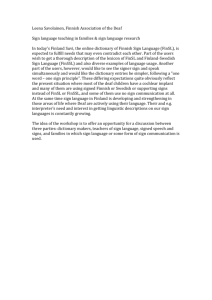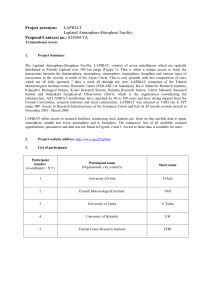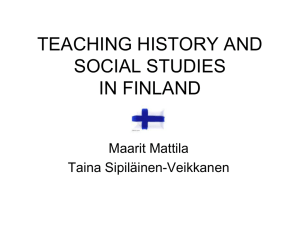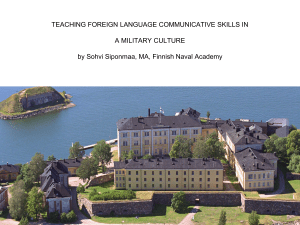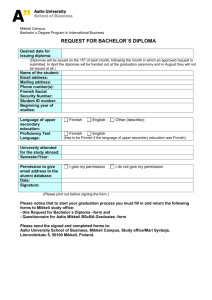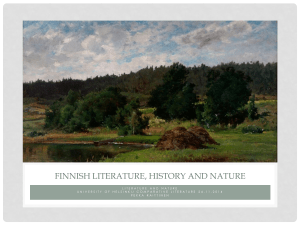Innovative Practices
advertisement
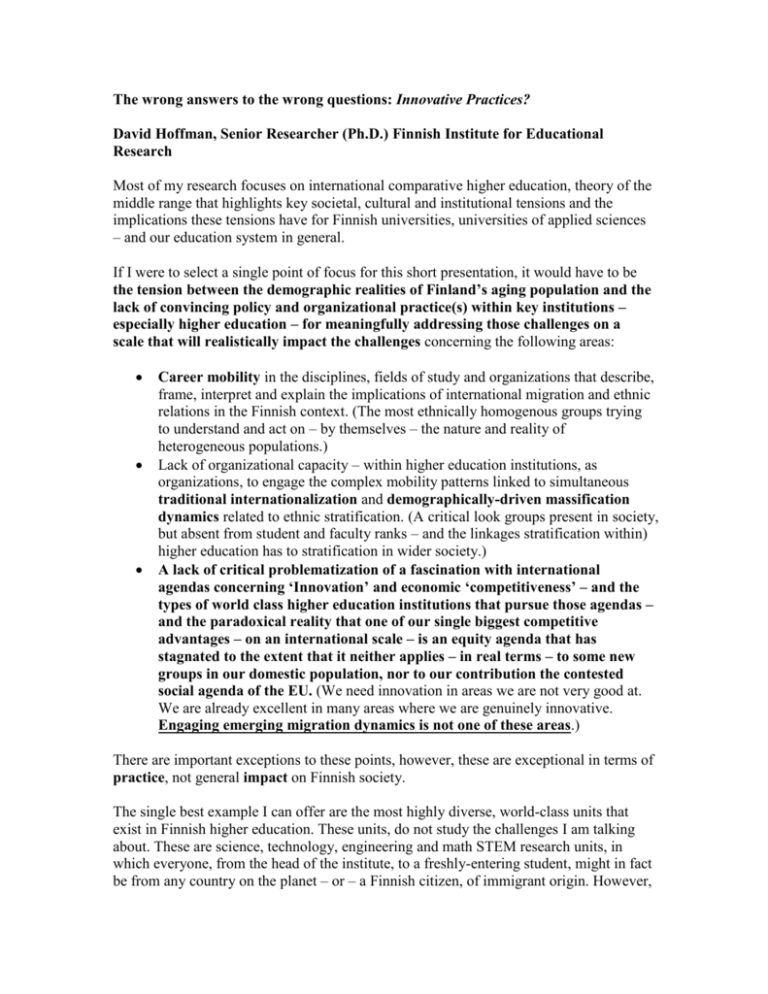
The wrong answers to the wrong questions: Innovative Practices? David Hoffman, Senior Researcher (Ph.D.) Finnish Institute for Educational Research Most of my research focuses on international comparative higher education, theory of the middle range that highlights key societal, cultural and institutional tensions and the implications these tensions have for Finnish universities, universities of applied sciences – and our education system in general. If I were to select a single point of focus for this short presentation, it would have to be the tension between the demographic realities of Finland’s aging population and the lack of convincing policy and organizational practice(s) within key institutions – especially higher education – for meaningfully addressing those challenges on a scale that will realistically impact the challenges concerning the following areas: Career mobility in the disciplines, fields of study and organizations that describe, frame, interpret and explain the implications of international migration and ethnic relations in the Finnish context. (The most ethnically homogenous groups trying to understand and act on – by themselves – the nature and reality of heterogeneous populations.) Lack of organizational capacity – within higher education institutions, as organizations, to engage the complex mobility patterns linked to simultaneous traditional internationalization and demographically-driven massification dynamics related to ethnic stratification. (A critical look groups present in society, but absent from student and faculty ranks – and the linkages stratification within) higher education has to stratification in wider society.) A lack of critical problematization of a fascination with international agendas concerning ‘Innovation’ and economic ‘competitiveness’ – and the types of world class higher education institutions that pursue those agendas – and the paradoxical reality that one of our single biggest competitive advantages – on an international scale – is an equity agenda that has stagnated to the extent that it neither applies – in real terms – to some new groups in our domestic population, nor to our contribution the contested social agenda of the EU. (We need innovation in areas we are not very good at. We are already excellent in many areas where we are genuinely innovative. Engaging emerging migration dynamics is not one of these areas.) There are important exceptions to these points, however, these are exceptional in terms of practice, not general impact on Finnish society. The single best example I can offer are the most highly diverse, world-class units that exist in Finnish higher education. These units, do not study the challenges I am talking about. These are science, technology, engineering and math STEM research units, in which everyone, from the head of the institute, to a freshly-entering student, might in fact be from any country on the planet – or – a Finnish citizen, of immigrant origin. However, the university units that research the types of challenges – outlined above – are generally not to be confused with these units, as mobility linked to world-class competitive horizons is decades away from being realized, because of the time-scales involved. To conclude: I would offer a point from a recent study carried out in Japan (which shares many key characteristics of Finnish society, the main ones being the demographic challenges, the general tendency to essentialism foreignness and lack of convincing policies and practices aimed at coping with the challenges linked to these.) The most successful acculturation outcomes – in the long term – experienced by Japanese employers and their foreign employees were shared by those who understood the consensus-orientated nature of Japanese culture, but also who were able to problematize it, in order to overcome the naivety linked to a lack of experience (for new immigrants and employers, who often underestimate the complexity linked to acculturation) and for the impossibility of most employers to actually know the realities of acculturation in their own society. We need to come up with different – more critical, constructive and problematic – questions. The key difference between Finland and many countries who are much more successful in respect to engaging the types of challenges I’ve outlined is the nature of these types of discussions at individual, group, institutional and societal levels. Many demographicallydriven migration dynamics are fairly generic. What is different is the cultural, political and historical specificity – and the way in which this situated reality manifests in social institutions – and the resulting stratification in society. References (Note: The following sources form the basis for my panel remarks.) • Aittola, H. 2001. Academic Life and the Pressure of Massification. In J. Välimaa (Ed.). Jyväskylä: InstituFinnish Higher Education in Transition: Perspectives on Massification and Globalisationte for Educational Research, 111-138. • Baldwin, R. & Blackburn, R. 1981. The Academic Career as a Developmental Process: Implications for Higher Education. The Journal Of Higher Education, 52 (6), 598-614. • Berry, J.W., & Sam, D.L. 1997. Acculturation and adaptation. In J.W. Berry, Y.H. Poortinga, & J. Pandey (Eds.), Handbook of cross-cultural psychology (2nd ed.) Vol. 3, pp. 291-326). Boston: Allyn & Bacon. • Blommaert, J. 2009. The role of language in determining identity. Language and identity: Immigrant’s linguistic rights in authority processes. 19 Nov. 2009. • Bowden, M. & Doughney, J. 2010. Socio-economic status, cultural diversity and the aspirations of secondary students in the Western Suburbs of Melbourne, Australia. Higher Education, Volume 59 (1): 115-129. • Enders, J. 2001. Between State Control and Academic Capitalism: A Comparative Perspective on Academic Staff in Europe. In. J. Enders. (Ed.) Academic staff in Europe: changing contexts and conditions. Westport: Greenwood Press, 1-23. • • • • • • • • • • • • • • • • Fairweather, J. 2002. The Mythologies of Faculty Productivity. Journal of Higher Education 73 (1), 26-48. Finnish Ministry of Education & Culture. 2008. Strategy for the Internationalisation of Higher Education Institutions in Finland 2009-2015. Finnish Ministry of Education Publications. Finnish Ministry of Labour. 2007. Labour Force 2025. Full employment, high productivity and good jobs will provide the foundation for well being as the working age population diminishes. Forsander, A. 2004. Social Capital in the Context of Immigration and Diversity: Economic Participation in the Nordic Welfare States. Journal of International Migration and Integration 5 (2), 207-227. Hoffman, D., Välimaa, J., Saarinen, T., Söderqvist, M., Raunio, M. & Korhonen, M. In press. The International Sole™ of Finnish Higher Education: A Virtual Vanishing Act. International Journal of Cyber Ethics in Education. 2011. Volume 1, Issue 2. Hoffman, D., Raunio, M., Korhonen, M. In Press. Finnish Universities: Car dealerships, churches or cultural institutions? In P. Teixeira & D. Dill (Eds.), Public Vices, Private Virtues? Assessing the Effects of Marketization in Higher Education. Rotterdam: Sense Publications. Hoffman, D., El-Massri, A., Babila Sama, T., Korhonen, M. & Raunio, M. 2011. The best science, best science in Finnish or the best Finnish scientists? In J. Ursin & J. Lasonen (Eds.), Education and Social Change in Finland. Jyväskylä, Finland: FERA. Hoffman, D., Valimaa, J. & Huusko, M. 2008. The Bologna process in academic basic units: Finnish universities and competitive horizons. In J. Välimaa & O-H Ylijoki (Eds.) Cultural Perspectives on Higher Education. Springer, 221-237. Hoffman, D. 2007. The Career Potential of Migrant Scholars in Finnish Higher Education: Emerging Perspectives and Dynamics. Jyväskylä Studies in Education, Psychology and Social Research. No. 318. Jyväskylä University Press. Horta, H. Veloso, F. & Grediaga, R. Navel Gazing: Academic Inbreeding and Scientific Productivity. Management Science, Articles in Advance, pp. 1–16, ©2009 INFORMS. Jaakkola, M. 2005. The Attitudes of Finns Towards Immigrants in 1987-2003. Labor Policy Studies 286. Finnish Ministry of Labour, Helsinki Kahn, S. & Pavlich, D. 2001. Academic freedom and the inclusive university. UBC press: Vancouver. Kallo, J. 2009. OECD Education Policy: A Comparative and historical study focusing on the thematic reviews of tertiary education. Jyväskylä: FERA. Komisarof, A. 2009. Testing a modified Interactive Acculturation Model in Japan: American-Japanese coworker relations. International Journal of Intercultural Relations 33 (2009), 399-418. Laudel, G. 2005. Migration Currents Among the Scientific Elite. Minerva 43, 377-395. Malin, A. 2005. School Differences and Inequities in Educational Outcomes. Jyväskylä: Institute for Educational Research. • • • • • • • • • Marginson, S. & van der Wende, M. 2007. Globalisation and Higher Education. OECD. Education Working Paper No. 8. Musselin, C. 2004. Towards a European Labour Market? Some Lessons drawn from Empirical Studies on Academic Mobility. Higher Education 48, 55-78. Mamiseishvili, K. 2009. Foreign-born women faculty work roles and productivity at research universities in the United States. Higher Education, 60 (2), 139-156. Raunio, M., Korhonen, M. & Hoffman, D. (2010). Kannattaako kansainvälistyä? Suomen yliopistot kansainvälisinä akateemisina ympäristöinä. Työraportteja 7/2010. Tieteen-, teknologian- ja innovaatiotutkimuksen yksikkö, Yhteiskuntatutkimuksen instituutti, Tampereen yliopisto. Raunio, M. 2004. Aivovuodosta aivokiertoon: Huippuosaajat talouden voimavarana Helsinki: Elineinoellämän Valtuuskunta (EVA). Söderqvist, M. 2005. Ulkomaalaiset työnantajan silmin. Helsinki, Edita. Trondal, J., Gornitzka, A. & Gulbrandsen, M. 2003. Conceptual Lens. In Å. Gornitzka, M. Gulbrandsen & J. Trondal (Eds.) Internationalisation of Research and Higher Education. Olso: Norwegian Institute for Studies in Research and Higher Education, 16-35. Välimaa, J. & Hoffman, D. 2007. The future of Finnish higher education challenged by global competitive horizons. In S. Marginson (Ed.) Prospects of Higher Education: Globalization, Market Competition, Public Goods and the Future of the University. Rotterdam: Sense Publishers, 185-200. Ylijoki, O. 2003. Entangled in academic capitalism? A case study on changing ideals and practices of university research. Higher Education 45(3), 307-335.
